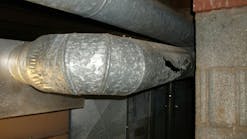There are two kinds of mechanical contractors in the world: those who have a service division, and those who don’t. Or, if you prefer, farmers and hunters.
Companies that don’t have a service arm typically have what they call a “set-up crew” or a “warranty crew.” These companies feel that all they need to do is install a system, keep it running for one year, and then let it go. Think of these companies as hunters: they go out, knock down a job, and move on.
Obviously, as the president of a service division, I don’t understand this type of thinking. Yet, I see it happen over and over again: contractors develop a relationship with a building owner, then just walk away from it.
Companies with service arms, on the other hand, are more like farmers. They cultivate long-term relationships with customers. Such companies understand that for every new commercial system they install, there’s the potential of 20 years (or more) of revenue from a service and maintenance contract.
The Real Value of Service
Of course, all a service and maintenance contract does is provide a technician the ability to go out to a customer’s building and change filters and clean drain pans and keep things going. The real benefit of having the contract is that years down the road, when the equipment needs to be replaced, you’ve got an inside track on the replacement.
Mechanical systems, no matter how well designed, manufactured, and installed, do break down. And, under a typical service agreement, anything that needs repair is charged over and above the terms of the contract. So a $10,000 service and maintenance agreement could end up bringing in $40,000 to $60,000 each year based on repairs. If your company doesn’t have a service component, that’s what you’re missing out on.
Setting Up a Service Arm
If you’re interested in starting a service division at your company, you’ll have to address the “chicken or the egg” question: Do you hire the service technician first, or the salesperson first?
In my opinion, the first step is to find a competent, qualified salesperson to go out and start getting service agreements. That’s how you build a service business. Of course, you’ll eventually have to get the technicians to get the service to happen, but the main thing is to get service agreements.
Service agreements provide recurring revenue, and the service work drives the replacement business. Let’s look at Hill York Service as an example. We have a $20 million business. Of that, $5 million is in service contracts, and the other $15 million is from work that those service contracts throw off.
Having a dedicated salesperson is a must. Our construction company always tries to include a three-year or five-year service agreement in the contract upfront. However, in many cases, the companies that our construction company does Design/Build work for have their own maintenance staff. So our company hasn’t always been successful selling those types of agreements upfront.
That’s why it’s important to analyze and work with your existing customer base. Design/Build customers who don’t have their own in-house maintenance staffs are definitely candidates for a three- or five-year maintenance agreement.
I’ll give you one caveat about entering the service business: There’s a lot of competition out there, and one of your main competitors is the people you need to buy your equipment from. That’s not meant as a knock against the manufacturers. It’s just a fact, and both sides are aware of it.
For more help in starting up a service arm, MSCA, has its own management methods manual, which provides step-by-step instructions on how to run a service business. I’m sure other organizations offer similar guidelines. So, the knowledge is out there. All you need is the determination.
Optimizing an Existing Service Arm
Companies that already have service arms are always looking for ways to run them more efficiently. Here are four keys to a successful service company.
Maintain a local presence. The customers in your local area want to know that the company that’s maintaining their equipment is local. They don’t want to call an out-of state dispatch center. When customers call, they typically want service in a short period of time. If you’re a building owner in New York City, you’re going to be uneasy if you’re calling a number in Kansas for service.
Have a local address and a local phone number, so customers know that you’re in town and ready to take care of them.
Have a good service manager. Your technicians need a service manager on whom they can rely. They need someone who has a good feel for what goes on in the field, and who has a good technical background and knowledge.
Even the best technicians occasionally get lost and confused out there. In those times, they’re going to need a “guru” who can talk to them, not just a dispatcher.
All the customer sees is the technician. You don’t want your technicians out there fumbling and bumbling. Back them up with a supervisor who can help them out of tough spots.
Training, training, training. Good service technicians are hard to find.
Work with your local vocational school or community college. We’re fortunate to have technical school in our area with a good apprentice program from which to draw technicians.
Of course, union firms have opportunities to acquire technicians through their local joint labor/management apprenticeship committee.
Either way, once you’ve found good technicians, train them constantly.
Keep your service arm independent. Don’t have your company’s service arm report to the construction arm. It needs to be a separate concern or entity, or even a separate company.
There’s a different mindset when it comes to service. If you have your service arm reporting to construction, they’re not going to get the sense of urgency and the sense of cultivating customers that you need to run a successful service department.
In conclusion, the service business can be very tough. Of course, most things that are very rewarding usually are. u
Mark Kerney is president of Hill York Service, and chairman of the Mechanical Service Contractors Association (MSCA). Hill York Service is a $20 million air conditioning service company in South Florida. It is a sister organization to mechanical contracting firm Hill York Corporation, which has five locations in Florida with headquarters in Ft. Lauderdale. Hill York Corp. was Contracting Business’ 2000 Commercial Contractor of the Year. Kerney can be reached at 954/525-4200, e-mail [email protected].








